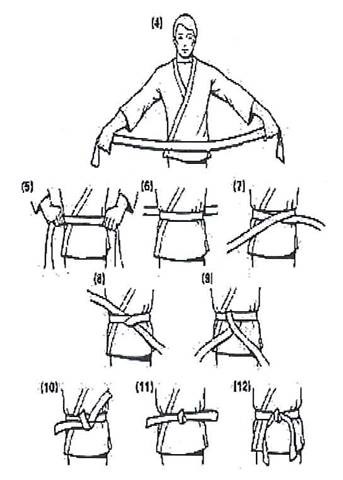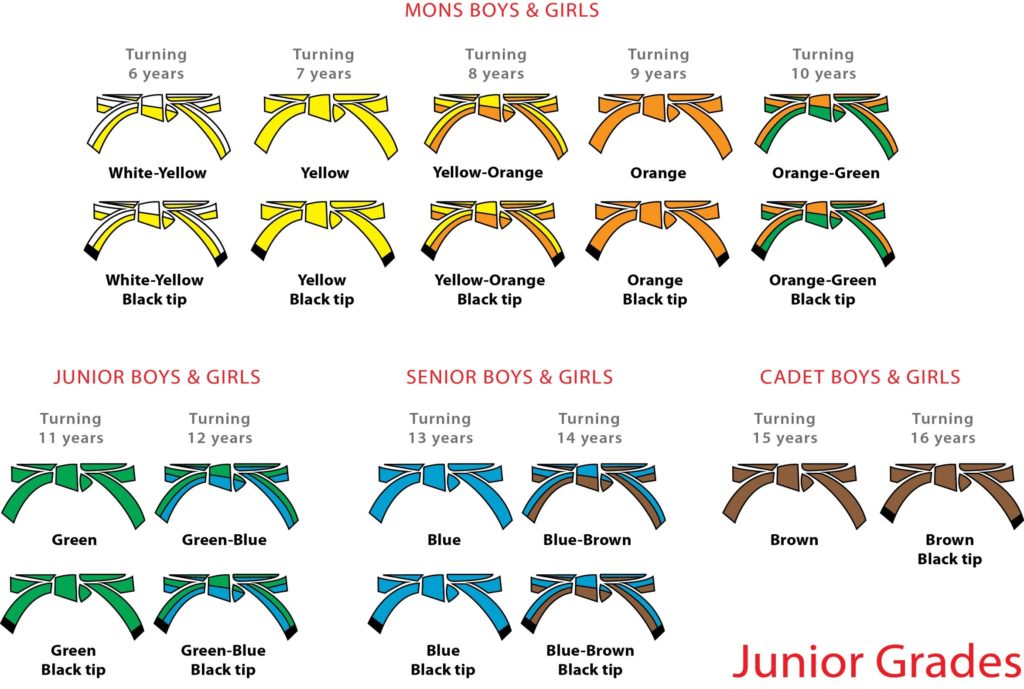Mentors
All green belts and above are encouraged to support lower graded players on the mat.
White and yellow belts will have a green belt to assist them with the following.
- Help with keeping the Judogi is on correctly at all times, including belt
- Be near them during warm up, and be their partner if needed
- Partners for first uchi komi exercise
- Partners for first randori
This is to encourage an early development of coaching skills, responsibility of other club members and of course make the newer players feel comfortable and confident.
Gradings
The Grading requirements are determined by the National body, The Judo Federation of Australia. This ensures your grade is recognised across Australia and your Dan grade is recognised Internationally.
Dan grading or black belt grading are carried out only by Nationally recognised Grading commissions,. Currently Marrara Judo Club coaches, John Bradley and Sue Gardiner are part of this commission and are recognised graders for JFANT.
Gradings are held on a weekend afternoon 3 times a year, Grading outside of this time is at the discretion of the coaches. In special circumstances it is possible to obtain you next belt if you demonstrate to your coach the required skill level in competition.
You will be graded on your skills by demonstrating your Ukemi (breakfalls), throwing techniques and groundwork, Combinations and counters both in groundwork and standing work.
Important skills to demonstrate are breaking balance, Judo etiquette and uki and tori skills. Remember your coaches are watching at all sessions and understand examination situations can sometimes produce nervous reactions.
Grading cost will be advised at each grading.
Senior and Junior Grading requirements are available on the Judo Federation of Australia’s website www.ausjudo.com.au
If there is effort, there is always accomplishment.
Jigoro Kano
Competition
As you progress in judo you will want to test your skills against the abilities of others of your own age, weight, sex, and skill level. A judo tournament is the place to do this. Tournaments begin with weigh-ins., usually from 8:30 am to 9:00 am. Interclub competitions cost $10. Tournament draws are set up so that you will fight people of your own age, weight, sex, and experience level.
One competitor will wear a red belt or a blue judogi. Competitors walk to the outside edge of the contest area (outside edge of the red mats) on their respective sides and bow. Walk toward each other and at the centre of the competition area bow to each other.. They then take one step forward and wait the referee calls “hajime’ (begin) and the contest will begin. Each time matte (wait) is called they return to their spots. When the referee calls soremade (that is all), they return to their positions and await the decision. When the referee awards the match, they each step back, and bow together. They leave the competition area the same way they came, bowing again at the edge of the contest area (the outside edge of the red area).
When a contestant scores ippon, the referee shall announce, “ippon,, soremade”. An ippon, or full point, immediately ends the match. An ippon can be scored in both tachi-waza (standing) and ne-waza (groundwork).
Ippon is scored when: A contestant with control throws the other contestant largely on his back with considerable force and speed; or a contestant holds with osaekomi-waza the other contestant, who is unable to get away for 20 seconds after the announcement of osaekomi; or a contestant gives up by tapping twice or more with his hand or foot or says “maitta” (I give up), generally as a result of a grappling technique, shime waza (strangle) or kansetsu-waza (armlock); or the effect of a strangle technique or arm lock is apparent to the referee.
Waza-ari is scored when: A contestant throws the other contestant with control, but the technique is partially lacking one of the elements necessary for ippon, or a contestant holds with osaekomi-waza the other contestant who is unable to get away for15 seconds or more, but less than 20 seconds.
If ippon is not scored, the winner of the match shall be the contestant who has scored the most of the point which holds the highest value.
Osaekomi – The referee shall announce osaekomi when the contestant being held is controlled by his opponent. He must have his back, both shoulders, or one shoulder in contact with the mat. Control can be made from the side, from the rear, or from the top. The contestant applying the hold must not have his leg(s) or body controlled by his opponent’s legs and at least one contestant must have any part of his body touching the contest area at the announcement of osaekomi. Should any one of these criteria not be met after the announcement of osaekomi, the referee shall immediately call toketa and the hold will be considered broken.
Judo etiquette (Expectations of behaviour, rules of the dojo)
- Bow before getting on the mat area and before and after training with other Judoka;
- Please be quiet and calm whilst waiting for your lesson to begin,
- Shoes (slip ons) are to be worn to the edge of the mat, have clean hands and feet for training;
- Arrive to training on time;
- If you arrive late, bow to all coaches before starting;
- Always bring water bottles;
- Always accept an offer to train or be an Uki for a Dan Grade (take it as a compliment);
- Respect other judoka in your words and actions;
- Treat your siblings with the same respect as other judoka;
- Always talk quietly on the Mat and never when your Coach is instructing;
- No hitting, kicking or punching even if you are only fooling around;
- Keep your Judogi in a tidy condition, remember to wear your thongs at appropriate times e.g. Drink time.
- Call your coaches “Sensei” on the Mat;
- Try and call your coach if you cannot make training;
- Do not leave the mat during training without checking with your coach;
- Line up in order of Grade;
- No running off the mat; you could trip and hurt yourself
- Matte means “Stop” immediately;
- Be aware of Smaller Judoka they can break.
Competition Words
- Hajime – begin
- Matte – stop
- Yoshi – carry on
- Osaekomi – hold is on
- Toketa – hold is broken
- lppon – full point
- Wazari – almost an ippon
- Shido – penalty
- Hansokumake – disqualified
- Soremade – finish
Judo Words
All coaches and referees use Japanese words on the mat here is a list of the most
common terms use on the mat
Ashi. Leg or foot as in ashi-waza
Dan Black belt
Dojo Judo practice place
Gake hooking
Gari reaping
Gatame Lock or hold as in kesa-gatame
garuma Wheel as in hiza-garuma
Gyaku Reverse
harai Sweeping as in harai-goshi
jigotai Defensive posture
joseki Place of honour (Dr Kano)
Judo Gentle way
Judogi Judo suit
Judoka One who practices judo
Kata Forms
Ko Small
Goshi Hip
Kuzure Broken
Kyu Coloured belt
yoko Side
Makikome Winding
nage Throw
Ne waza Groundwork
O Big as in o-goshi
Osaekomi Holding
Randori Free practice
rei Bow
sensei Teacher, coach, master
shizentai Natural posture
soto Outer as in o-soto-gari
sutemi Sacrifice
tachi Standing
tatami Mats
Te Hand as in te-waza hand techniques
tori The person doing the throw or attack
Uchi Inner as in o-uchi-gari
uchikomi Repeating practice of a technique
ude Arm
uke Person getting thrown
ukemi breakfalls
waza Group of techniques
Belts & Grades


